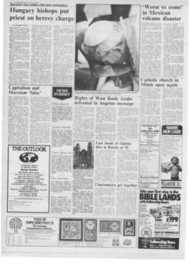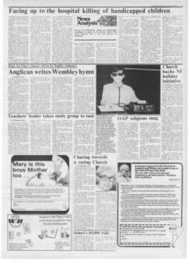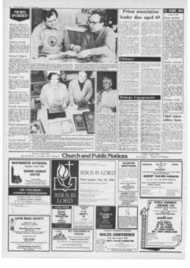Page 10, 16th April 1982
Page 10

Report an error
Noticed an error on this page?If you've noticed an error in this article please click here to report it.
Tags
Share
Related articles
Has Religious Tv A • 'mass' Impact ?
'milestone' Meeting For Religious Advisers
Tv Gave A Better View
Argentina Rejects Vatican Go-between As Crisis Threatens...
Religion On Channel 9
Afternoon tea and the Britishness of Buenos Aires
A GREAT many people were impressed by the man from Argentina who was one of the speakers from the audience when Robin Day's television discussion programme talked about the Falkland's crisis.
Not only was he courageous, but he spoke reasonably and well.
Rather smugly, but certainly with admiration, someone I know said: "He really seemed more British than Argentine."
I don't think that was said simply because this very pleasant and calm man expressed his disapproval of his country's use of force in the dispute, and clearly deplored the fact that it lived under a dictatorship.
But it did suggest what is, perhaps, a strange fact — that the British, a nation who over many decades had more to do with Argentina than possibly any other, have only the vaguest notion of what Argentinians are like.
It was interesting and significant that Falkland islanders appearing in front of cameras not very long before they were invaded also spoke of them as if they were people from outer space, even though they had recently been seeing them in increasing numbers.
Only a few hundred miles from the Argentine coast, but many thousands from Britain, their assessment of these strangers was an instinctive echo of Nuneaton.
There is no doubt at all about t'he overwhelming Britishness of the Falkland islanders.
But something unmistakeably British — in a slightly oldfashioned way, perhaps — is also instantly noticeable in Argentina, especially in Buenos Aires.
Influence from the United States — from the North Americans, as all South and Central Americans emphatically call them in rejection of any exclusive claim to the title — is not as much in evidence.
This is not in the least astonishing, because from early on, Britain did more than anyone, including for many years the Argentinians themselves, to develop the place, so that by the 1860s, President Bartolome Mitre was able to say that the British were the principal factor in the country's political, social and economic progress".
The railways, the tramways, the power plants, the water installations were largely British built and managed. Britons improved the cattle and sheep breeding, started cotton-growing, and were the carriers for Argentina's world trade. Not Wall Street but the City of London supplied the finance.
To this day, all this is to be seen in small things, which even in the early 1960s, when I used to visit there, were becoming, with our waning influence, just a little melancholy, but were still very apparent.
Prominent in Buenos Aires was — and, 1 believe, still is — a tall clocktower presented by the British residents to commemorate the centenary of the Argentine Republic.
Someone had scrawled, "Peron'", on the door, and the structure had a seedy look, but it could still have been plonked down in the middle of Bournemouth or Bexhill as a characteristic bit of the townscape.
The railway station was recognisably a smaller replica of Victoria station in London. Its trains took you out to suburbs with names like Hurlingham.
One day when I returned to my hotel rather tired in the afternoon, and asked for some tea meaning just that, a waiter brought me after a long interval what I can only describe as a full Edwardian tea, which it would have been hard to find in London, with cucumber sandwiches, muffins, cakes and all the trimmings, served with great style.
Commentators since the Falklands affair have talked freely about "Catholic" Argentina. I must confess that, in common with many others, I've never been able to make up my mind completely about the precise part played by Catholicism in Argentine life.
At the Embassy, I came to know rather well an elderly man who was part of the uniformed staff. He spoke English with an unmistakable Cork accent and turn of phrase.
When I asked him if it was long since he had been home, he said: "Ireland, you mean? I was never out of Argentina. I was born here."
The Irish started arriving in Argentina early, made good money doing manual work, building and digging, which was scorned by locals of Spanish colonial descent, were able to buy land, and easily found Catholic Argentinian girls to marry.
Certainly most Argentinians would say that they are Catholics, and church attendance has had social as well as spiritual importance. From time to time it has also been politically significant, as under the Ramirez military regime during the Second World War.
But relations between Church and State have not pursued a steady course any more than Argentinian politics have done so.
On the whole, the Catholic hierarchy has tended to be con
servative, and this was apparently something on which the present dictatorship hoped it could rely.
The most recent indications are that, after a sort of honeymoon period, this reliance proved to be misplaced. With some exceptions among the hierarchy, the Church has been moving closer to the poor, approaching the pattern emerging elsewhere in Latin America; and apparently spurred by Papal pronouncements and by the activities of the Papal Nuncio in Buenos Aieres, the bishops issued last June a document, The Church and the National Community, which was seen as the strongest criticism of the Government they have ever made as a group.
I have heard no report of any pronouncement by the Argentinian hierarchy about the regime's use of armed force to seize the Falklands.
It would be understandable if the clergy of Argentina shared what is evidently the popular view of Argentinian claims to sovereignty over the islands; but it would be pleasing to hear that they had defied public opinion, and had stated themselves
opposed to the junta's use of armed force in the dispute, in defiance of international undertakings, and to its persistence in this course in spite of the now clear risk that many lives may be lost.
If they were to do so, they would, of course, be making a very courageous stand.
Writers in some of the more serious papers last weekend expressed the hope that the drama over the Falklands would not cause people to forget some of the other places in the world where law-breaking, military egression, violence, injustice and oppression are endangering the peace of the world.
Indeed, a number of continuing stories have been finding less space in the papers and in broadcasting than they might have done normally.
We should certainly remember that people are going to the firing squads in Iran under a regime that purports to be guided expressly by the dictates of religion; that Catholic Poland, still suffering from the penury to which it was reduced by the incompetence of past Communist rulers, remains at Soviet behest under a stilling and unwanted military dictatorship; and that the invading Red Army is still trampling on Afghanistan. where the people continue to resist bravely.
Wheeling the world around
I WAS REMINDED of this when I noticed that a travel book of 1899, John Foster Fraser's Round the World on a Wheel, has just been republished and is exciting a lot of interest. I don't know what the Catholic Herald's review of it will have to say, but criticisms I have noticed so far seem to have been captivated by the pre-first world war British self-confidence and consciousness of superiority with which the author and his companions surmounted their difficulties as they travelled by bicycle through some territories that were then very remote indeed, including some parts of the Russian Empire.
I know this book. because I bought a copy off a sixpennny barrow while I was still at school. But more recently I acquired in much the same way a book written by the same man about the Russia of the Tsars just about two yeirs before the revolution that set it on the bloody road to becoming what it is today.
I bought John Foster Fraser's Russia of To-day (1915) because it had a great many interesting photographs of Petrograd and Moscow in late Tsarist times; and these are something that I discovered are very difficult to find in to-day's Russia, where old books are a black market commodity, and anything that might conceivably give an impression of relative order and prosperity before Lenin rescued the people is not encouraged.
In fact, though, I found that the text, based on eyewitness observation and enquiry at the source, has also considerable interest. There is a whole chapter on religion in Russia at that time, and although one knows that befog the revolution it had a great hold on the people, it is fascinating to have it described in great detail by a competent and obviously honest journalist; and I believe ordinary Russians today would find this to be so.
The sections on commerce, industry and agriculture are very informative. Of course, Russia used to be able to export grain before the revolution.
Clearly, St Ilya, the harvest saint, according to John Foster Fraser, must have had more of what it takes than the present bureaucrats, who have to buy the stuff in immense quantities from Argentina — providing current cause for thought — and from the United States when the President allows it.
An obvious question that arises is: Did the author see the revolution coming? Well, he would have had to be very unprofessional not to see that something was coming.
He has a final chapter called, What of the Future? Though he is modest about the value of his guesses, he has hopes of an end to autocracy and a gradual progress towards a liberal and democratic regime, with development on Western industrial lines.
We would all be living in a safer world if he had been right.
blog comments powered by Disqus











